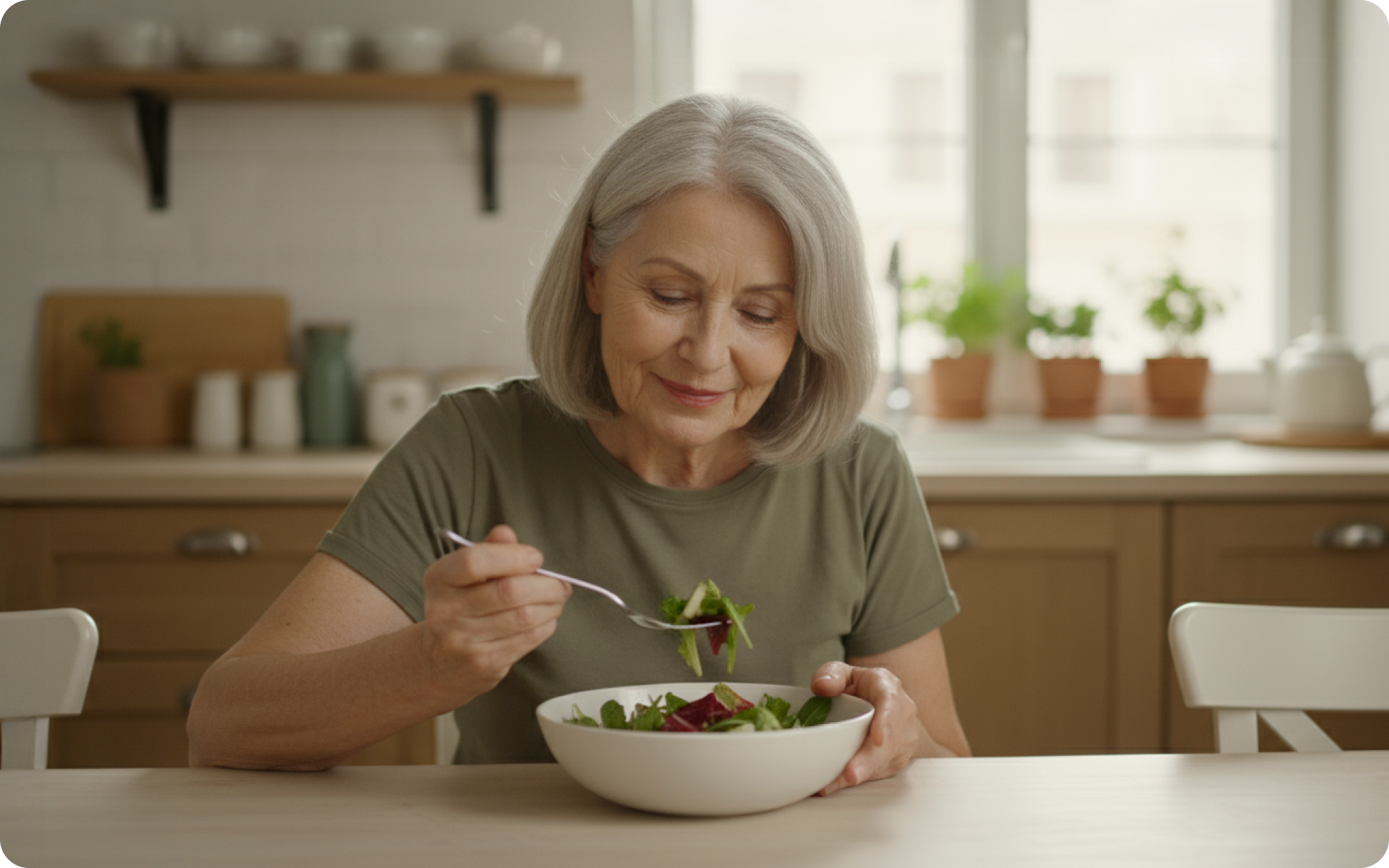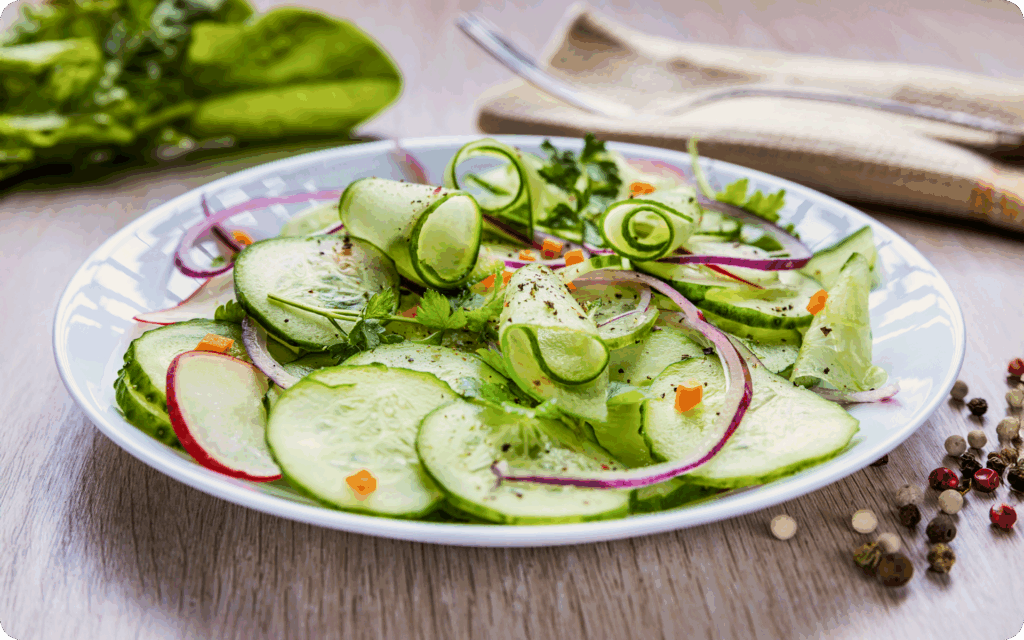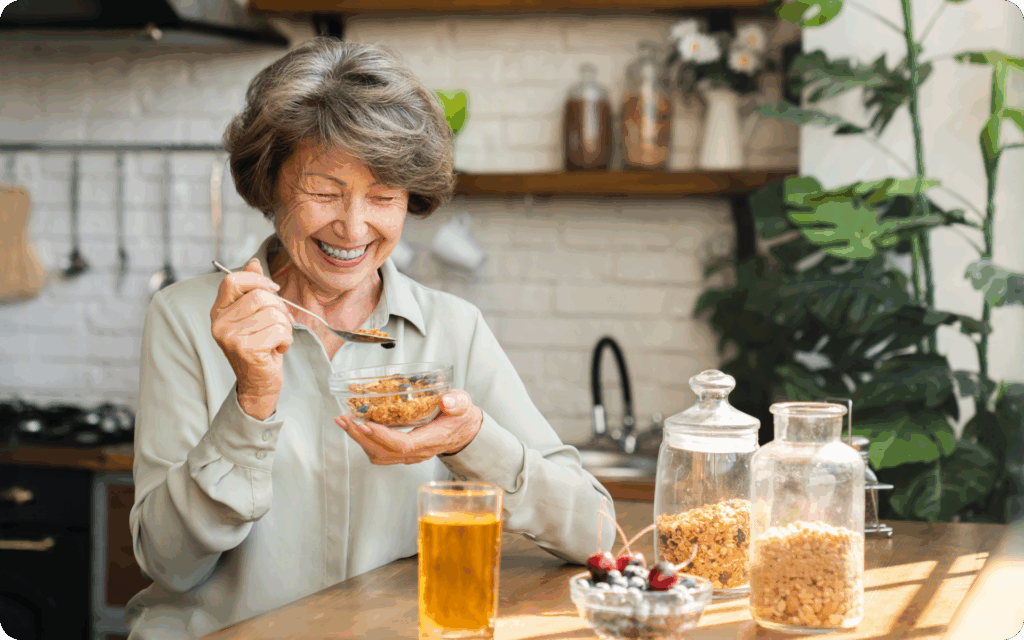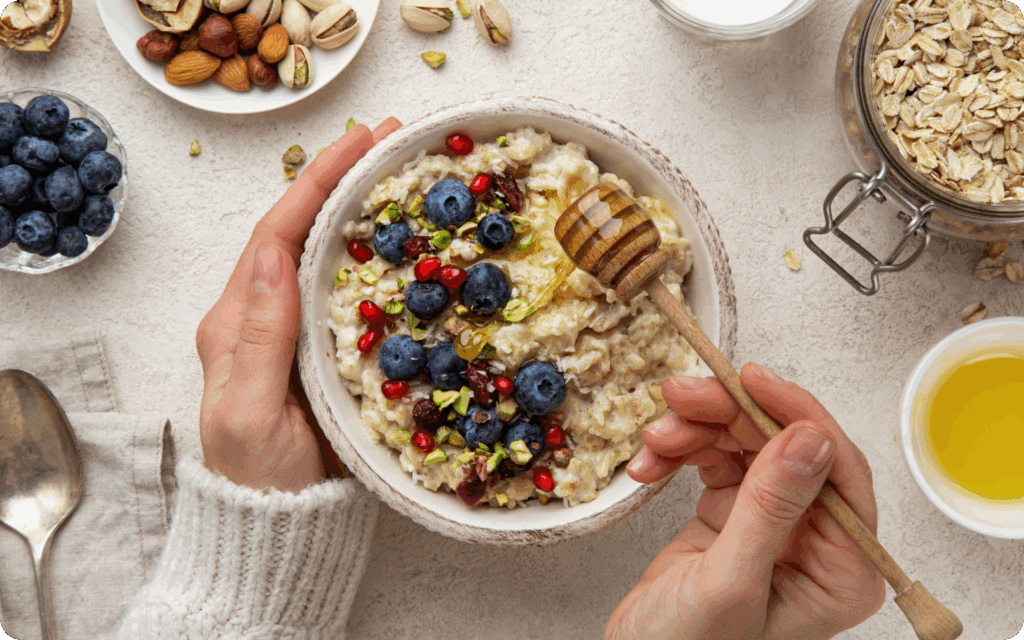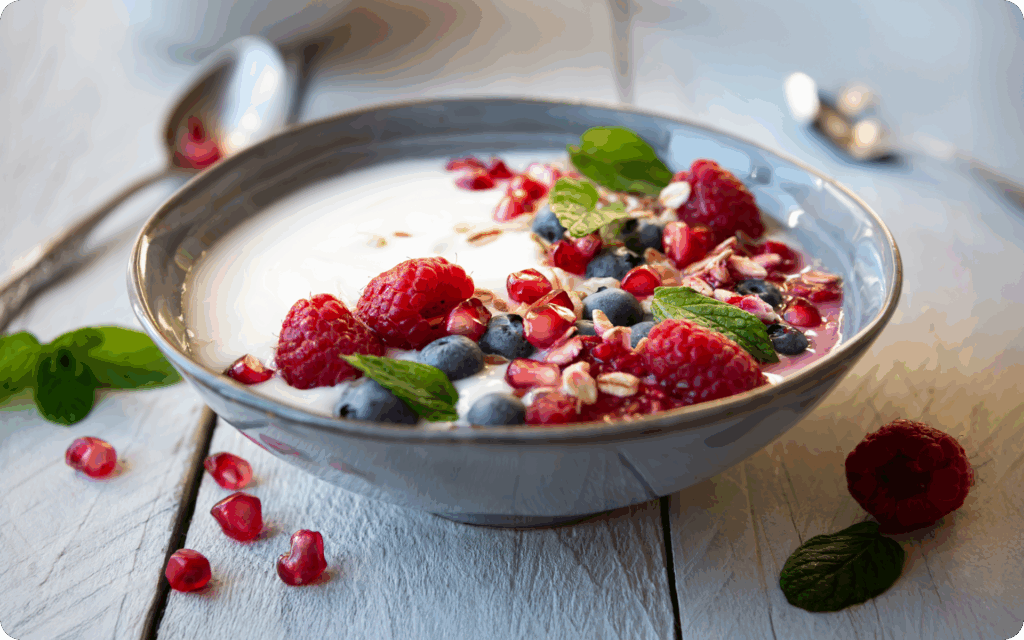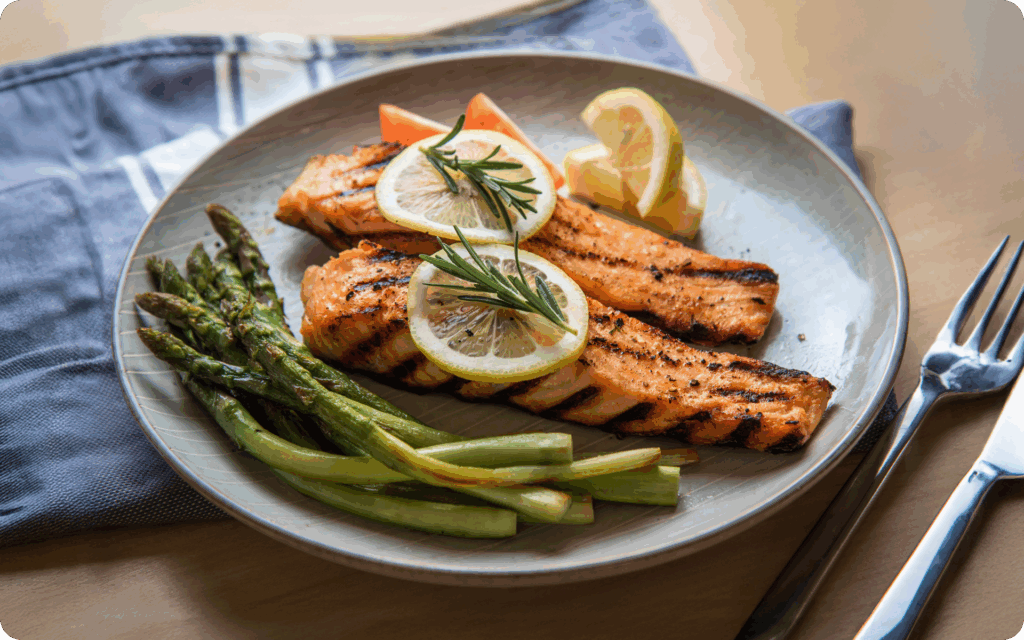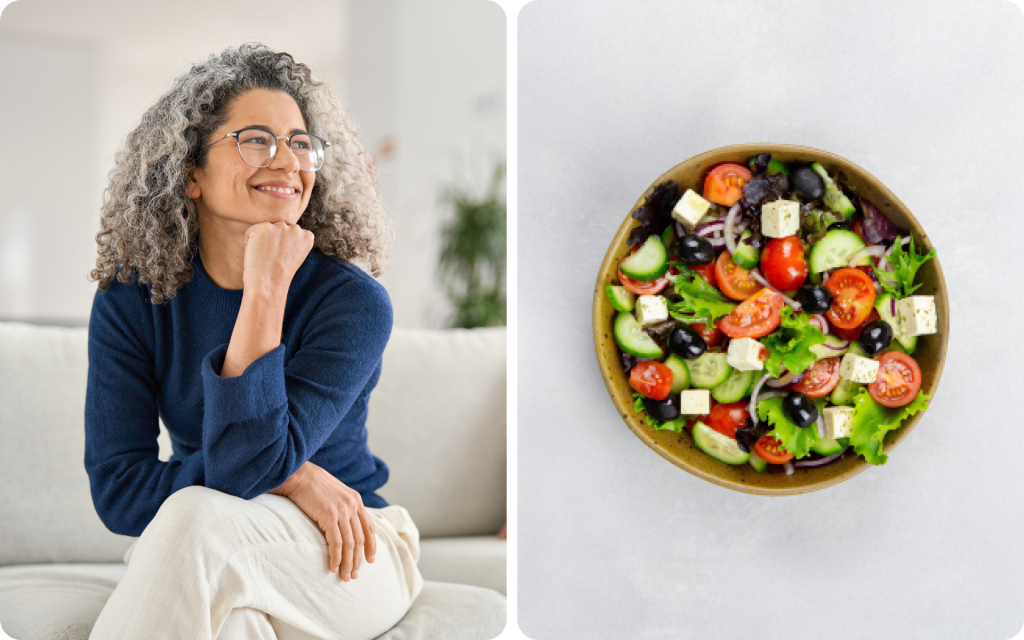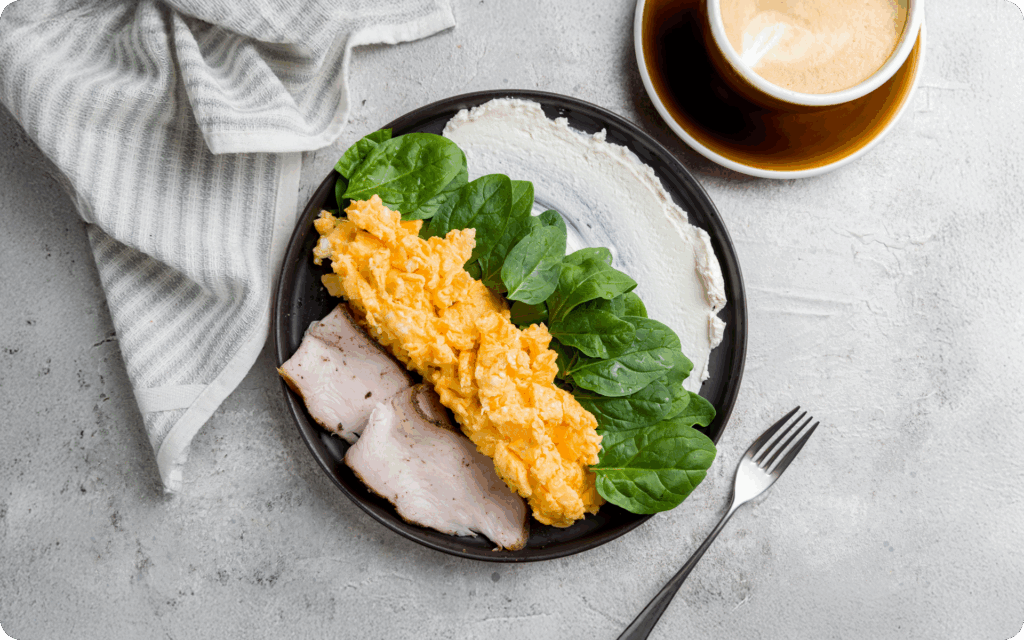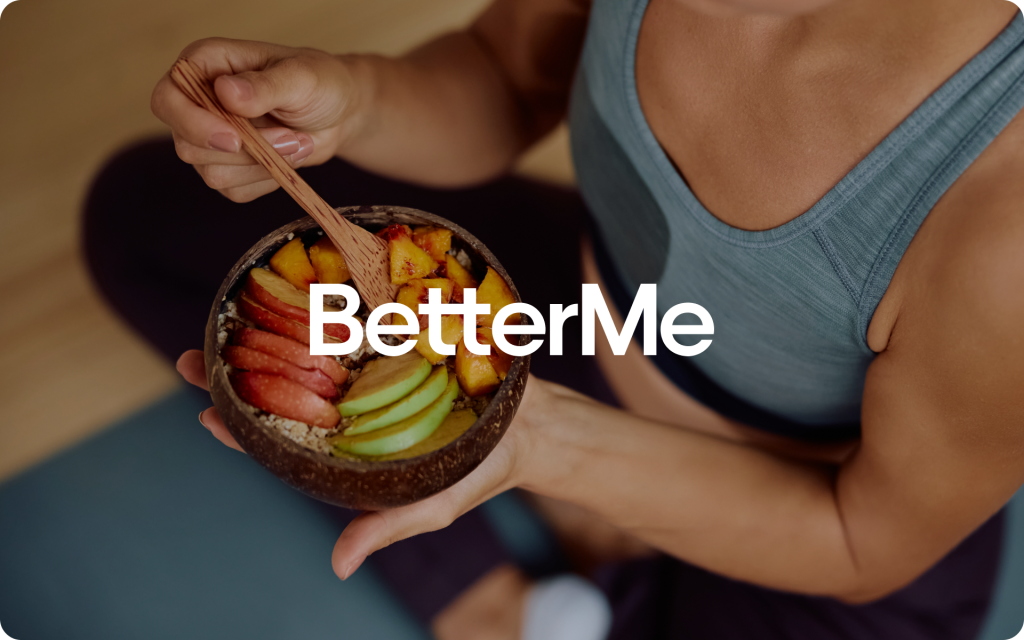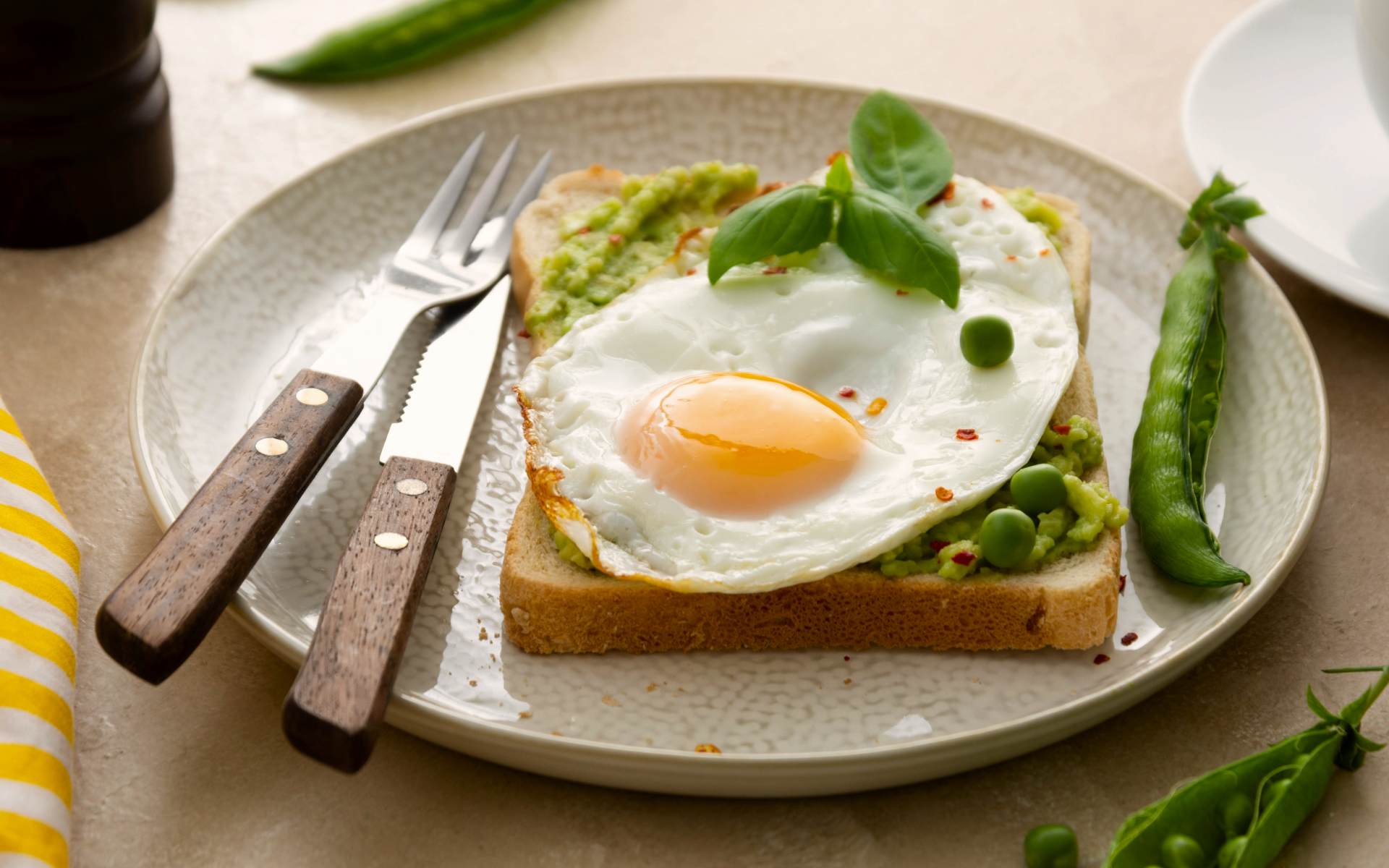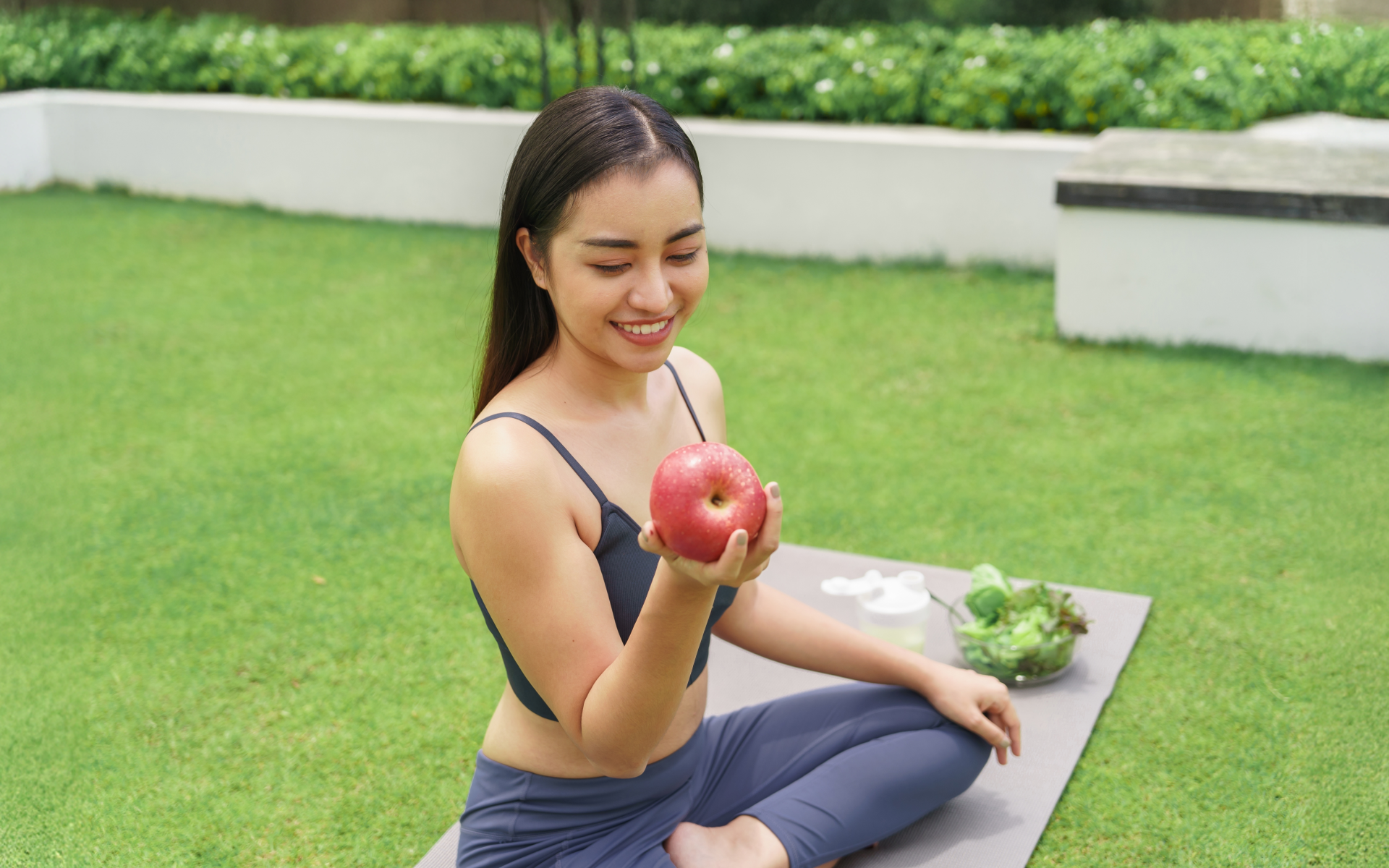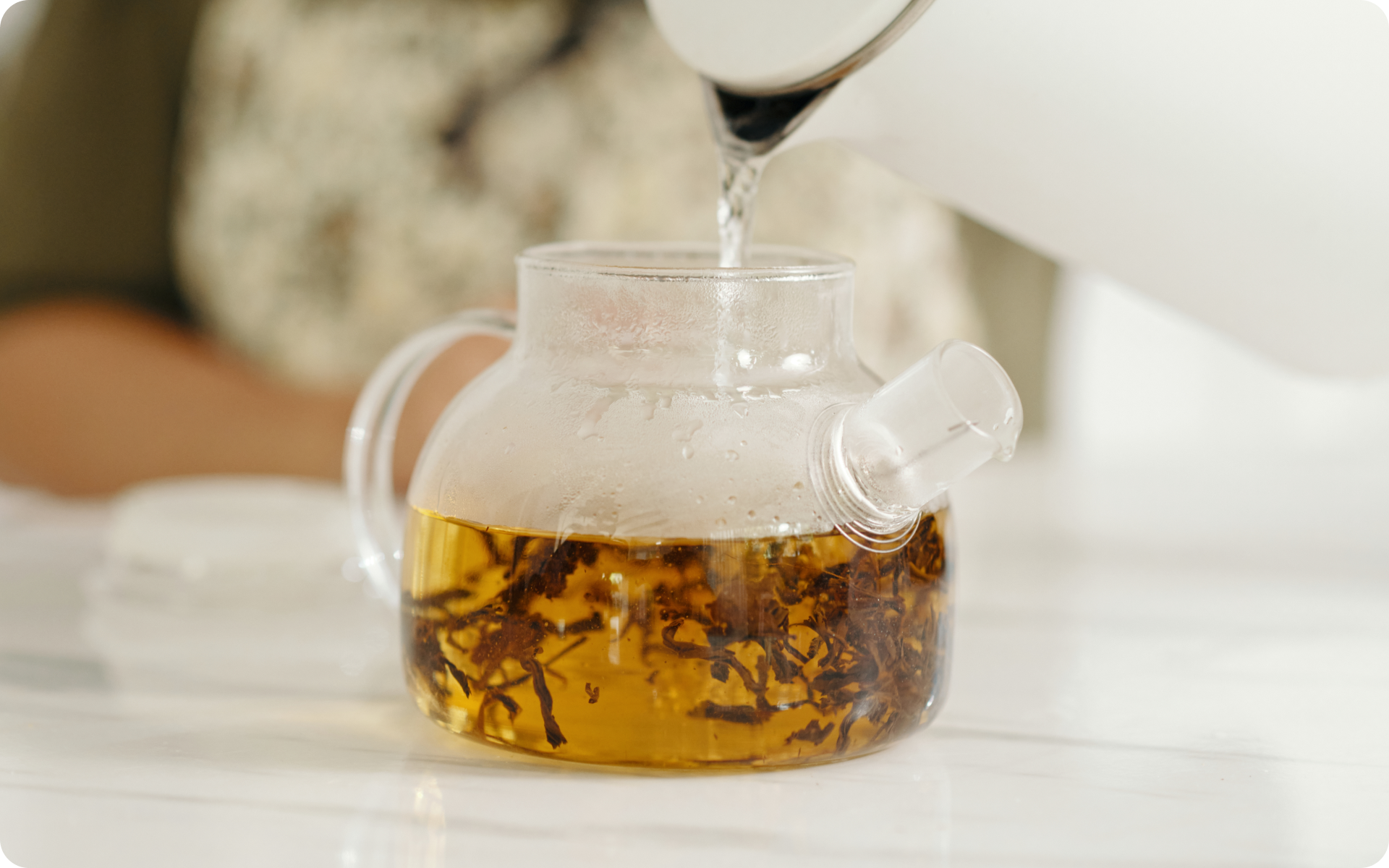Navigating nutrition in our later years can feel complicated.
As our bodies change, so do our dietary needs. You want to eat well to stay strong, sharp, and full of life, but the advice can be overwhelming. The good news is that with a few clear, expert-backed principles, you can build a diet that truly nourishes your body and supports your health for years to come.
Read on to learn all about nutrition for seniors, including 5 healthy foods they should eat every day.
What Foods Do Seniors Need The Most?
To understand what to eat, it helps to see the bigger picture.
The Food Safety Authority of Ireland (FSAI), an organization dedicated to ensuring food safety and providing science-based nutritional advice, created a food pyramid specifically for adults over 65. It’s a simple, visual guide that shows how much of each food group you should aim to eat for a balanced diet (1).
Here’s a breakdown of the FSAI food pyramid, from the bottom to the top (1):
- Vegetables, Salad, and Fruit (5-7 servings a day): This is the foundation of a healthy diet. These foods have loads of vitamins, minerals, and fiber.
Aim for a variety of colors (like a rainbow on your plate) to get a wide range of nutrients.
Vitamin C-rich options like oranges, peppers, and berries help your body absorb iron, which is vital for energy.
- Wholemeal Cereals and Breads, Potatoes, Pasta, and Rice (3-5 servings a day): These are your primary energy sources. This food group provides B vitamins for brain health and fiber to prevent constipation, a common issue for seniors.
It’s best to choose high-fiber, wholegrain options like porridge, wholemeal bread, and brown rice. If you’re curious about healthy meals for seniors, check out our earlier article.
- Milk, Yogurt, and Cheese (3-4 servings a day): This shelf is crucial for bone and muscle health. Dairy is an excellent source of calcium and high-quality protein. Low-fat options are just as nutritious.
If you use plant-based alternatives, choose unsweetened plant-based drinks fortified with calcium.
- Meat, Poultry, Fish, Eggs, Beans, and Nuts (2-3 servings a day): These foods provide the high-quality protein needed to maintain muscle strength and prevent frailty.
The FSAI recommends including a protein source in at least 2 meals daily.
Try to eat fish 1-2 times a week, with oily fish like salmon or mackerel featured once a week for heart-healthy omega-3s.
- Fats, Spreads, and Oils (In minimal amounts): Healthy fats from sources like olive, rapeseed, or sunflower oil are necessary, but we need moderation here.
Use a teaspoon to measure oil when cooking and choose grilling, baking, or steaming over frying.
- Foods High in Fat, Sugar, and Salt (Not every day, limit 1-2 times a week): This is the “top shelf” of the pyramid, which is the smallest recommended food group.
These foods, like cakes, biscuits, chips, and sugary drinks, offer little nutritional value and should be treated as occasional treats.
Reasons why BetterMe is a safe bet: a wide range of calorie-blasting workouts, finger-licking recipes, 24/7 support, challenges that’ll keep you on your best game, and that just scratches the surface! Start using our app and watch the magic happen.
Hydration and Key Supplements
Beyond the pyramid, staying hydrated is essential. The FSAI recommends 6-8 glasses of fluid for women and 8-10 for men daily. Water, low-fat milk, and sugar-free drinks all count (1).
A helpful tip: drink tea between meals, as strong tea can interfere with iron absorption from your food.
ESPEN, the European Society for Clinical Nutrition and Metabolism, reinforces this with specific fluid targets of at least 1.6 liters for women and 2.0 liters for men (2).
This expert group of clinicians and scientists also stresses the importance of protein, recommending at least 1.0 gram per kilogram of body weight per day for healthy older adults, and even more (1.2-1.5 g/kg) if you are dealing with an illness (2).
Their guidance also suggests an energy target of around 30 calories per kilogram of body weight, adjusted for your activity level and health (2).
Finally, the FSAI makes one critical supplement recommendation for everyone over 65:
Take a 15 microgram (µg) vitamin D supplement every day (3).
Vitamin D is a vital recommendation because it’s nearly impossible to get enough of the substance from food and sunlight in many climates to keep your bones strong and help prevent falls. Consuming 15 micrograms is equivalent to 600 international units (IU).
Read more: Sample Meal Plan For A 50-Year-Old Man To Lose Weight
What Are 5 Foods That Seniors Should Eat?
Now that we have the framework, let’s focus on the 5 foods that seniors should eat every day. These 5 food groups are the building blocks of a diet designed to keep you healthy, active, and independent.
1. Colorful Vegetables and Fruit
Vegetables and fruits are your daily defense system. They contain high amounts of antioxidants, vitamins, and fiber that support everything from your immune system to your digestive health. Aiming for 5-7 servings a day helps prevent heart disease and can lower the risk of certain cancers (4).
- Why they matter: They provide Vitamin C (for iron absorption and immunity), fiber (for gut health), and a host of other micronutrients. Research highlighted by the NIH shows that many older adults can be low in key vitamins, and a diet rich in produce helps fill these gaps (5).
- Examples and quantities: A serving is roughly 1 medium apple or orange, a bowl of salad, a half-cup of cooked vegetables, or a small glass of unsweetened fruit juice (limit juice to 1 serving per day).
- Practical tips: Keep frozen vegetables and fruits canned in their own juice on hand for easy meal additions.
What is the number one fruit that seniors should eat?
While there’s no single “best” fruit, citrus fruits like oranges and kiwis are excellent for their high vitamin C content. But variety is key, so enjoy a mix!
2. Wholemeal Cereals and Grains
These foods are your body’s preferred fuel source. Choosing wholemeal and wholegrain varieties gives you sustained energy, fiber, and essential B vitamins that support brain function and overall health (6).
- Why they matter: High-fiber options are critical for preventing constipation.
Fortified breakfast cereals can be a great source of iron and B vitamins, nutrients that the research notes are sometimes lacking in older adults (7).
- Examples and quantities: Aim for 3-5 servings daily. A serving could be a bowl of porridge, 2 thin slices of whole-wheat bread, or 1 cup of cooked brown rice or pasta.
- Practical tips: Start your day with porridge oats.
When making sandwiches, use whole-wheat bread. Leave the skin on potatoes when boiling or baking for extra fiber.
3. Dairy and Fortified Alternatives
This group is your go-to for strong bones and muscles.
With 3-4 servings a day, you get the calcium, protein, and vitamin D needed to maintain bone density and support muscle mass (8).
- Why they matter: As we age, our risk for osteoporosis and muscle loss (sarcopenia) increases (9). Protein and calcium from dairy are a powerful combination to fight this (10). Many milk products are also fortified with vitamin D, supporting the daily supplement you should be taking.
- Examples and quantities: A serving is a 200ml glass of milk, a small cup (125g) of yogurt, or a matchbox-sized piece (25g) of cheese.
- Practical tips: Add milk to soups, sauces, and desserts like custard or rice pudding. A glass of milk or yogurt makes an excellent, protein-rich snack between meals.
4. Protein-Rich Foods (Meat, Fish, Eggs, Beans, Nuts)
Getting enough high-quality protein is non-negotiable for staying strong and mobile.
Aim for 2-3 servings a day, and make sure protein features in at least 2 of your daily meals. This protein amount is a core recommendation from both FSAI and ESPEN (1, 11).
- Why they matter: Protein prevents the muscle loss that leads to frailty and an increased risk of falls. Iron from red meat, eggs, and beans helps keep your blood healthy and your energy levels up.
- Examples and quantities: A serving can be 2 eggs, 50-75g of cooked lean meat or chicken, 100g of cooked fish, or ¾ cup of cooked beans or lentils.
- Practical tips: Include oily fish like salmon or mackerel once a week. Eggs are an inexpensive and versatile protein source. Lentil soup or beans on toast make for a quick, healthy, and protein-packed meal.
5. Healthy Fats and Oils
Your body needs some fat to function, but the type and amount matter (12). Focus on small amounts of unsaturated fats.
- Why they matter: Healthy fats are essential for absorbing specific vitamins and providing energy (12). Using them sparingly helps manage weight and supports heart health.
- Examples and quantities: Use about 1 teaspoon of oil (like olive, rapeseed, or sunflower) per person when cooking. When using butter or spreads, use them lightly.
- Practical tips: Cook foods by grilling, baking, steaming, or stir-frying instead of deep-frying. Be mindful of hidden fats in mayonnaise and creamy salad dressings.
Read more: Nutrition For The Elderly: Tips To Promote Healthy Eating
7-Day Meal Plan For Older Females
This sample plan is inspired by the FSAI pyramid, aiming for the recommended daily servings. Men may need slightly larger portions and more fluids. Remember, this is a guide, so feel free to swap in your favorite healthy foods.
- Monday
- Breakfast: Porridge made with 200ml milk, topped with a handful of berries.
- Lunch: Lentil soup with 2 slices of whole-wheat bread. A yogurt cup.
- Dinner: Grilled salmon (100g) with ½ cup of potatoes and 1 cup of steamed green beans and broccoli.
- Snacks: An apple, a handful of unsalted nuts.
- Tuesday
- Breakfast: 2 scrambled eggs on 1 slice of whole-wheat toast with grilled tomatoes.
- Lunch: Tuna and sweetcorn in a whole-wheat pita pocket with a side salad.
- Dinner: Chicken stir-fry (75g) with mixed peppers, onions, and ½ cup of brown rice.
- Snacks: A banana and a glass of milk.
- Wednesday
- Breakfast: Fortified breakfast cereal with 200ml milk and a sliced banana.
- Lunch: Leftover chicken stir-fry. A cup of yogurt.
- Dinner: Lean beef mince (75g), cottage pie with a sweet potato topping and a side of peas.
- Snacks: An orange, a few whole-wheat crackers with cheese.
- Thursday
- Breakfast: Porridge made with 200ml milk, topped with stewed apple.
- Lunch: A bowl of homemade vegetable soup and a hard-boiled egg.
- Dinner: Baked cod (100g) with ½ cup of mashed potatoes and 1 cup of steamed carrots.
- Snacks: A pear, a small yogurt.
- Friday
- Breakfast: A small yogurt with a handful of fortified muesli and berries.
- Lunch: Beans on 2 slices of whole-wheat toast.
- Dinner: Mixed vegetable and chicken (75g) curry with ½ cup of brown rice.
- Snacks: 2 plums, a handful of unsalted nuts.
- Saturday
- Breakfast: 1 poached egg on 1 slice of whole-wheat toast. A small glass of orange juice.
- Lunch: Chicken salad sandwich on whole-wheat bread.
- Dinner: A small portion of roast chicken (75g) with roasted root vegetables and steamed cabbage.
- Snacks: A banana, a glass of milk.
- Sunday
- Breakfast: Fortified breakfast cereal with 200ml milk and a handful of dried fruit.
- Lunch: Leftover roast chicken with a large side salad.
- Dinner: 3-bean chili with a small whole-wheat roll.
- Snacks: An apple, a small yogurt.
This complete 7-day Meal Plan For Elderly females provides a balanced framework for nutrition.
What Is The Best Diet For 70 Year Olds?
There is no single “best” diet, but the healthiest eating patterns for older adults share common principles.
The World Health Organization (WHO), the leading global public health agency, promotes healthy ageing through balanced diets, regular physical activity, and person-centered care (13). Successful dietary patterns are those that you can stick with long-term and that meet your unique needs.
BetterMe: Health Coaching app helps you achieve your body goals with ease and efficiency by helping to choose proper meal plans and effective workouts. Start using our app and you will see good results in a short time.
Here’s a look at a few highly-regarded approaches:
- FSAI Pyramid-Aligned Diet: This pattern, as detailed above, is specifically designed for older adults in Ireland but its principles are universal. It emphasizes whole foods, high-quality protein, calcium-rich dairy, and plenty of fruits and vegetables, while providing clear serving sizes (1).
- Mediterranean-Style Diet: This diet is rich in fruits, vegetables, whole grains, legumes, nuts, and olive oil. It includes moderate amounts of fish and dairy and limited red meat. It aligns well with the FSAI pyramid and is renowned for its heart health benefits (14).
- DASH (Dietary Approaches to Stop Hypertension) Diet: Originally designed to lower blood pressure, the DASH diet is excellent for overall health.
It focuses on fruits, vegetables, low-fat dairy, whole grains, and lean proteins, while limiting salt, added sugar, and saturated fat (15).
All these diets are consistent with ESPEN’s expert recommendations to prioritize protein and hydration (2). They also help address the micronutrient deficiencies (like vitamin D, B12, and iron) that research has identified as common in older adults (16).
Sometimes, despite your best efforts, getting enough nutrition from food alone can be a challenge, especially during or after an illness.
In these cases, ESPEN suggests that if dietary counseling and food fortification aren’t enough, an oral nutritional supplement (ONS) can be beneficial for older adults with or at risk for malnutrition. They recommend choosing a supplement that provides at least 400 calories and 30 grams of protein per day and using it for at least a month to see benefits (2).
What Is The Best Breakfast For Seniors?
A good breakfast sets the tone for the entire day. For seniors, the ideal breakfast powers your morning with protein, fiber, and key nutrients. For more details about meal plan for seniors at home, take a look at our prior publication.
The qualities of a great breakfast include:
- High in Protein (20-30 grams): This helps stimulate muscle maintenance right from the start of the day (11).
- Rich in Fiber: This promotes digestive regularity and helps you feel full (17).
- A Source of Calcium and Vitamin D: Start your day with a contribution to your daily bone-health goals.
- Hydrating: Include a drink like water, milk, or a small glass of juice.
Here are a few sample breakfasts that fit the bill:
- Porridge Power Bowl: Make porridge with 200ml of milk (for protein and calcium), and top with berries (for vitamins and fiber) and a sprinkle of seeds (for healthy fats).
- Eggcellent Toast: 2 scrambled or poached eggs on a slice of whole-wheat toast. Serve with a side of grilled tomatoes or spinach for extra nutrients.
- Yogurt and Cereal Combo: A bowl of plain yogurt topped with a handful of fortified, high-fiber cereal and your favorite fruit.
Which Food Is Not Recommended For Senior Citizens?
Just as important as what to eat is what to limit.
The FSAI pyramid places foods high in saturated fat, added sugar, and salt on the “top shelf” for a reason (18). These foods should not be eaten every day; the recommendation is a maximum of 1-2 times a week, and in tiny amounts.
These are often considered some of the 10 worst foods for seniors when consumed regularly.
They include the following food choices (19):
- Sugary drinks and snacks: Fizzy drinks, sodas, cakes, biscuits, pastries, and sweets.
- Salty snacks: Crisps and other ultra-processed, salty foods.
- Processed meats: Sausages, bacon, and burgers are often high in salt and saturated fat.
- Fried foods: These are high in calories and unhealthy fats.
Overconsumption of these foods can contribute to unwanted weight gain, high blood pressure, and an increased risk of falls and other health issues (20). Instead of adding a lot of salt for flavor, try using herbs, spices, pepper, or lemon juice.
Additionally, you can choose low-calorie, low-sugar dressings and sauces for meat, salads, and potatoes.
Swap sugary drinks for water, milk, or sugar-free cordials.
An excellent dinner for an older adult is balanced and easy to digest (21). It should include a lean protein source (like baked fish, grilled chicken, or beans), a complex carbohydrate (like a small potato or a scoop of brown rice), and plenty of vegetables (at least half the plate). Cooking methods like baking, grilling, or steaming are best. There is no single “number one fruit that seniors should eat.” Variety is essential to get a wide range of vitamins. However, fruits rich in vitamin C, like oranges, kiwis, strawberries, and bell peppers (yes, they are technically a fruit!), are excellent daily choices because they help with iron absorption (22). Eggs are an excellent, affordable source of high-quality protein (23). For most older adults, it’s perfectly healthy to eat an egg a day. They are part of the “Meat, Poultry, Fish, Eggs, Beans, and Nuts” group, where the recommendation is 2-3 servings per day. Two eggs count as one serving. If you have high cholesterol or heart disease, check with your doctor to see if they have specific recommendations for you. Absolutely not! Blueberries are a fantastic choice. They contain lots of antioxidants and vitamins (24). Like all berries, they are a colorful and nutritious addition to porridge, yogurt, or as a simple snack. There is no reason for seniors to avoid them unless a doctor has advised otherwise for a specific medical reason.Frequently Asked Questions
What is the best dinner for the elderly?
What fruit should seniors eat daily?
How many eggs a week should a senior eat?
Should seniors stop eating blueberries?
The Bottom Line
A well-balanced and varied diet is vital for everyone, but especially for seniors.
As we age, our bodies require different nutrients to maintain good health. That’s why it’s essential to eat a variety of foods from each food group and monitor portion sizes.
It’s also crucial to listen to your body and make modifications as needed. Seniors may have specific dietary restrictions due to medical conditions or medications they are taking. It’s essential to follow these recommendations and work with a healthcare professional to ensure proper nutrition.
Remember, eating healthy doesn’t mean sacrificing taste or enjoyment of food. With some creativity and knowledge about nutrition, you can still enjoy delicious meals that meet your nutritional needs as a senior.
DISCLAIMER:
This article is intended for general informational purposes only and does not serve to address individual circumstances. It is not a substitute for professional advice or help and should not be relied on for making any kind of decision-making. Any action taken as a direct or indirect result of the information in this article is entirely at your own risk and is your sole responsibility.
BetterMe, its content staff, and its medical advisors accept no responsibility for inaccuracies, errors, misstatements, inconsistencies, or omissions and specifically disclaim any liability, loss or risk, personal, professional or otherwise, which may be incurred as a consequence, directly or indirectly, of the use and/or application of any content.
You should always seek the advice of your physician or other qualified health provider with any questions you may have regarding a medical condition or your specific situation. Never disregard professional medical advice or delay seeking it because of BetterMe content. If you suspect or think you may have a medical emergency, call your doctor.
SOURCES:
- Healthy Eating for Older Adults (2015, assets.gov.ie)
- ESPEN guideline on clinical nutrition and hydration in geriatrics (2019, clinicalnutritionjournal.com)
- New advice on Vitamin D supplement for people aged 65 years and older (2020, gov.ie)
- Health Benefits of Fruits and Vegetables (2012, sciencedirect.com)
- Nutrition Concerns for Aging Populations – Providing Healthy and Safe Foods As We Age (2010, ncbi.nlm.nih.gov)
- The Impact of Cereal Grain Composition on the Health and Disease Outcomes (2022, frontiersin.org)
- Malnutrition in Older Adults—Recent Advances and Remaining Challenges (2021, pmc.ncbi.nlm.nih.gov)
- Milk and dairy products: good or bad for human health? An assessment of the totality of scientific evidence (2016, pmc.ncbi.nlm.nih.gov)
- Sarcopenia and Osteoporosis (2023, pmc.ncbi.nlm.nih.gov)
- Impact of whole dairy matrix on musculoskeletal health and aging–current knowledge and research gaps (2020, link.springer.com)
- Protein intake and exercise for optimal muscle function with aging: Recommendations from the ESPEN Expert Group (2014, pmc.ncbi.nlm.nih.gov)
- Dietary Fats (2019, sciencedirect.com)
- Promoting physical activity and healthy diets for healthy ageing in the WHO European Region (2023, iris.who.int)
- Mediterranean Diet: From Ancient Traditions to Modern Science—A Sustainable Way Towards Better Health, Wellness, Longevity, and Personalized Nutrition (2025, mdpi.com)
- DASH Diet To Stop Hypertension (2023, ncbi.nlm.nih.gov)
- Vitamin status in older adults in relation to the use of nutritional supplements (2012, sciencedirect.com)
- The Health Benefits of Dietary Fibre (2020, pmc.ncbi.nlm.nih.gov)
- Top Shelf (2023, assets.gov.ie)
- The Hidden Dangers of Fast and Processed Food (2018, pmc.ncbi.nlm.nih.gov)
- Ultra-processed food exposure and adverse health outcomes: umbrella review of epidemiological meta-analyses (2024, pmc.ncbi.nlm.nih.gov)
- Pathways in formulating foods for older people (2024, sciencedirect.com)
- Eye on Nutrition: Iron and Vitamin C (n.d., wicworks.fns.usda.gov)
- The Golden Egg: Nutritional Value, Bioactivities, and Emerging Benefits for Human Health (2019, pmc.ncbi.nlm.nih.gov)
- Recent Research on the Health Benefits of Blueberries and Their Anthocyanins (2020, sciencedirect.com)
